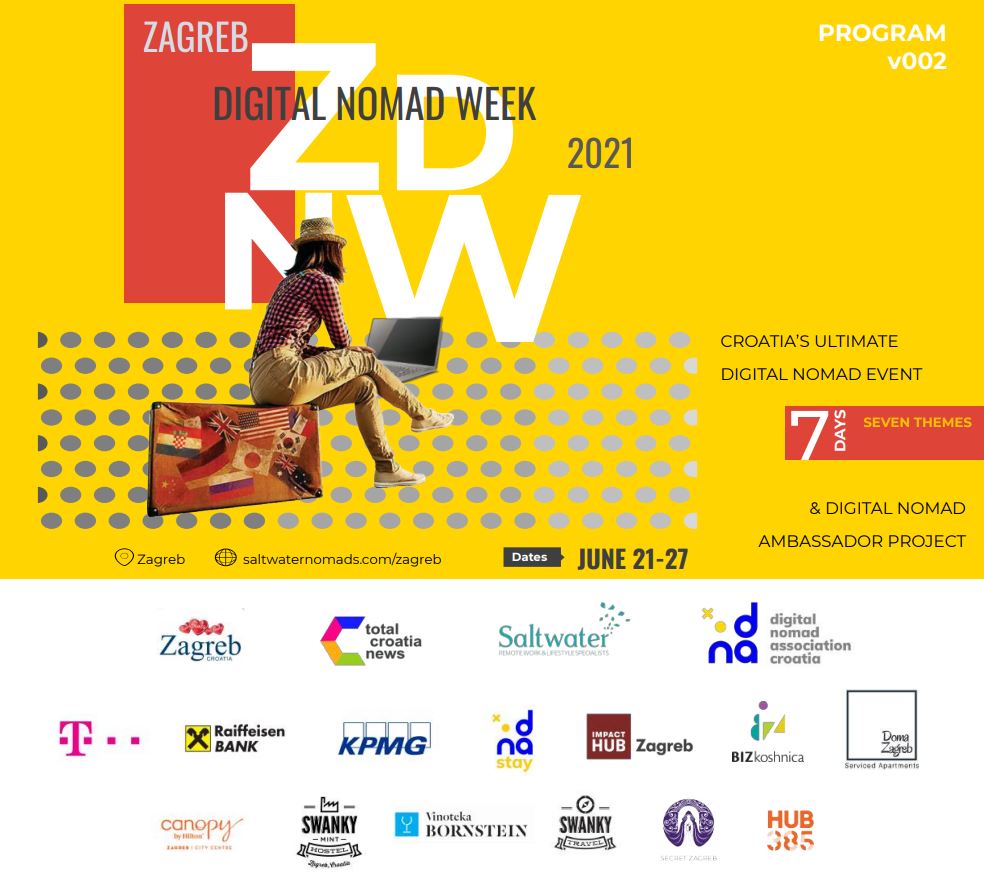Future of Work, the View from Barcelona: Albert Cañigueral Interview
June 19, 2021 - Recently appointed to lead the Catalan Government's Transparency and Open Data division, Albert Cañigueral will be a Future of Work speaker at Zagreb Digital Nomad Week.
One of the many exciting things about next week's Zagreb Digital Nomad Week (ZDNW) is the sense of continuity from recent events in Dubrovnik. Dubrovnik for Digital Nomads last October was the first-ever digital nomad conference in Croatia, and it was followed by the world's first Digital Nomad-in-Residence project in the Pearl of the Adriatic.
One of the ten winners was a Future of Work explorer (and published author on the subject), Albert Cañigueral from Barcelona, whose application video you can see above and initial interview here.
Albert's contribution and insights throughout the month were magnifcent, and he was a popular member of the group, and he became known as the Dubrovnik Beach Bum after an exercise in stereotypes and reality on the digital nomad lifestyle.
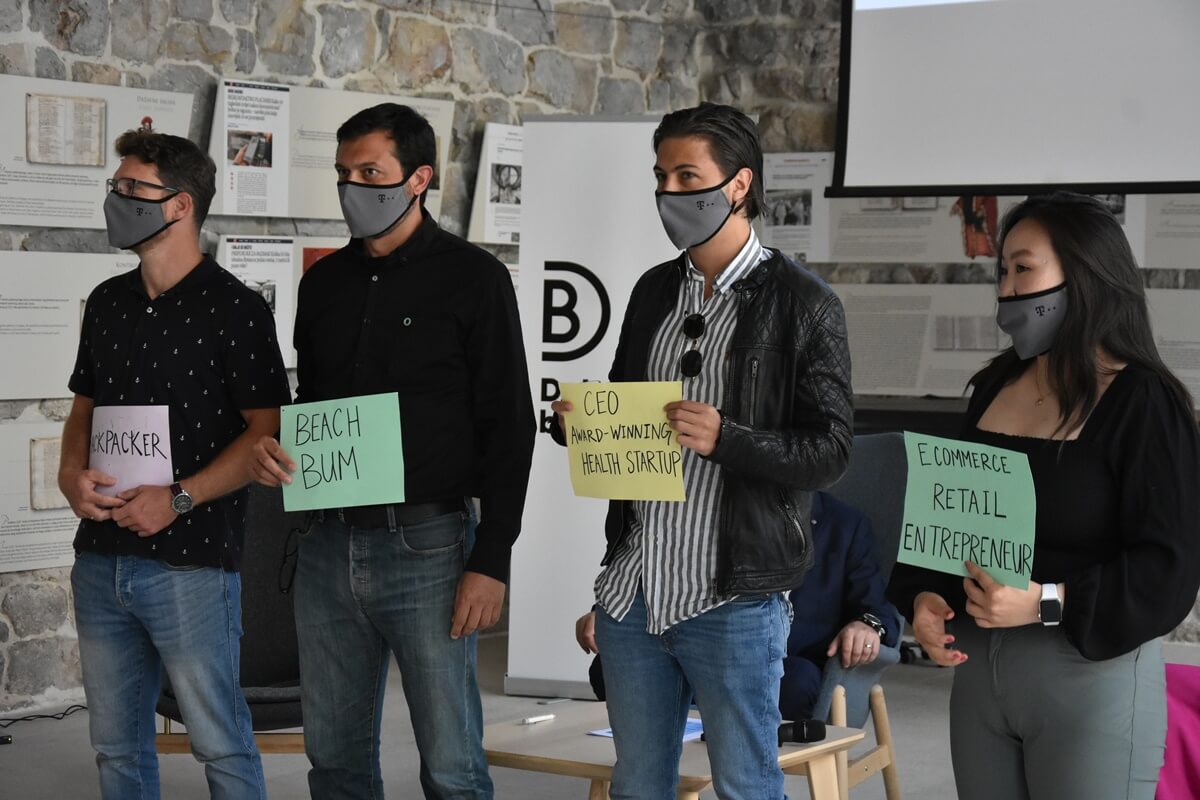
It was only natural that we would try and enlist Albert's expertise in ZDNW, and we are delighted that he has agreed to be a keynote speaker on Friday, June 25, on the subject of the Future of Work.
Albert had initially planned to come in person, but was recently approached to head the Catalan Government's Open Data and Transparency division, and so his presentation will be done remotely. Albert kindly found some time to tell us more about his thoughts about Croatia as a DN destination, as well as the opportunities and challenges ahead.
Albert will not be the only contributor from the Dubrovnik programs, with fellow resident nomad-in-residence, Ron Tardiff, coming down from Budapest, and Dubrovnik Tourist Board director Ana Hrnic also a ZDNW panelist.
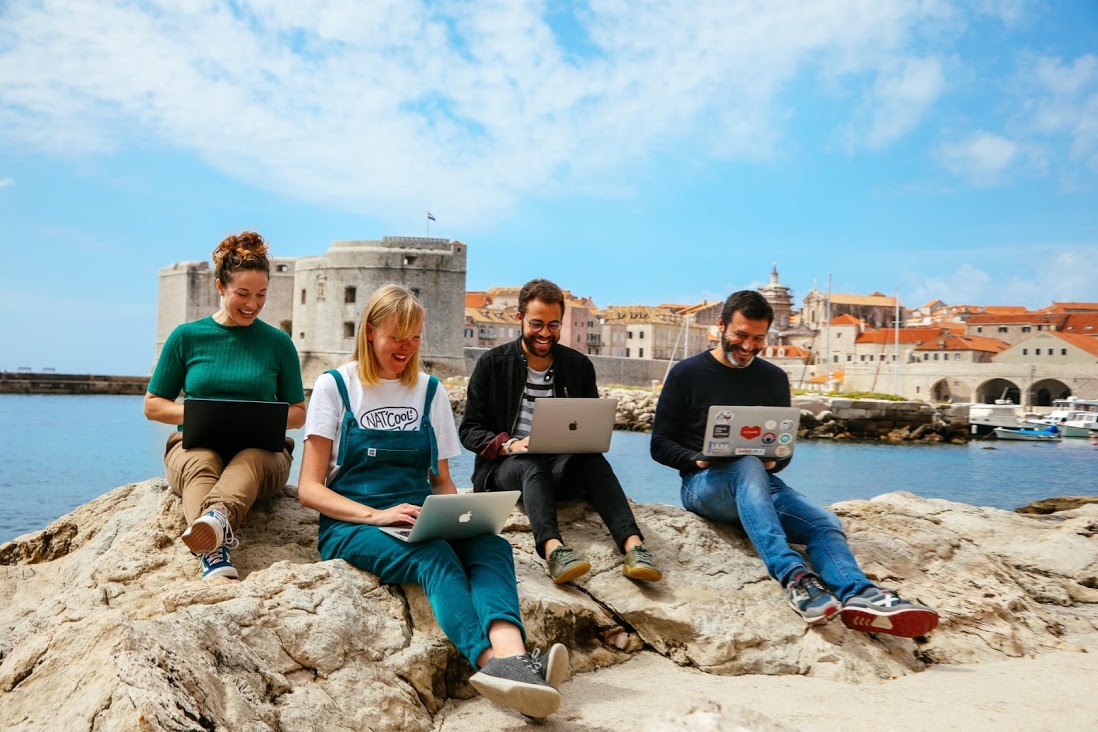
1. From Dubrovnik beach bum to leading the Catalan government's Transparency and Open Government division. Your life has changed since we last met in Dubrovnik a few weeks ago. Congratulations on your new position. Tell us firstly a little about that.
Thank you! It was completely unexpected. I’ve been part of a project “Catalunya 2022” with 30 experts to deliver a post-pandemic set of ideas for Catalunya. One of the co-leaders of this project, Victoria Alsina, was appointed “Consellera d'Acció Exterior i Transparència” of the catalan government (Generalitat de Catalunya). When she started creating her team, I was asked to join, and I could not refuse. It’s an honor to serve from this position and I am sure I will learn a lot too.
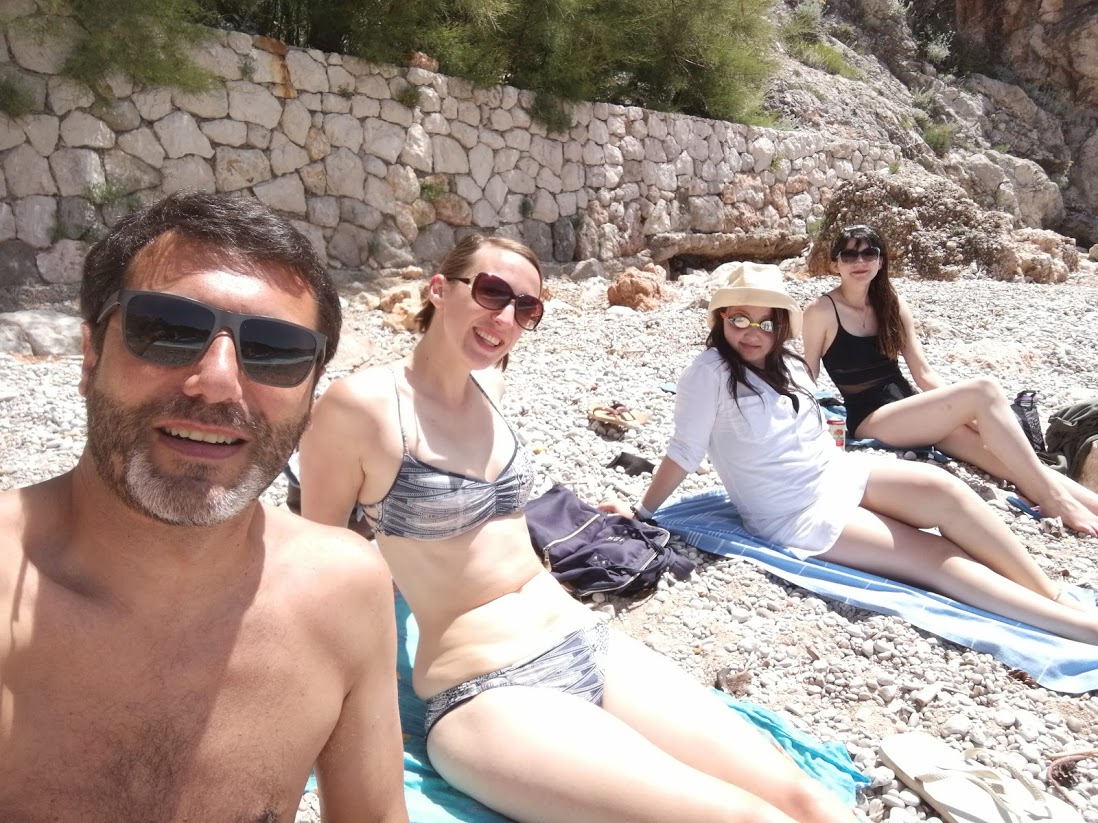
2. As an expert and published author on the future of work, and someone who has just spent a month as one of Dubrovnik's Digital Nomads-in-Residence, your perspective is very interesting. Tell us firstly about your Dubrovnik experience. You were obviously not expecting to find the perfect DN destination. How would you sum up your 4 weeks there?
The sentence “content is king, context is queen” is widely used in marketing. In the DN universe I would translate as people (community) is king and location is queen. Our experience was just mind-blowing because of the community of DNs that were selected to participate, the partners of some DNs who decided to be part of the adventure, the local people who joined the workshops and other moments, the professional team that ran the whole programme and also the support from the city hall (in the middle of local elections!).
Then the 4 weeks were a lot about exploration, discovery, going with the flow, collective learning, etc.
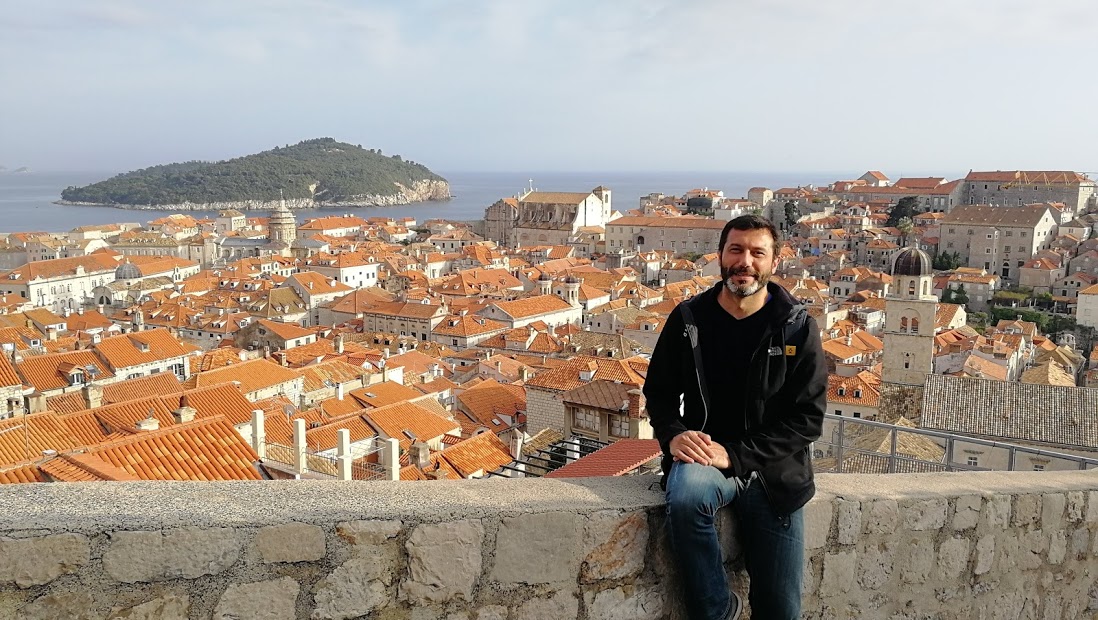
3. Barcelona is an established nomad hot spot. What lessons can cities like Zagreb learn to make themselves more attractive to potential digital nomads?
“Simplicity is the ultimate sophistication” is a quote attributed to Leonardo da Vinci. For any destination that wants to attract DNs the simpler the better. I mean that in terms of where to find DN-related information, where to access services (lodging, work spaces, health, communication, etc.), bundled offers for mid and long term stays, reduced language barriers, where to find other DNs and locals, etc.
I would also encourage cities to break from the “competing for DNs” with a scarcity mentality and embrace a “network of DN destinations” with an abundance mentality and cooperation among cities. What about a network of DN friendly destinations?

4. From your recent experience in Croatia, what would you say are its competitive advantages in the DN niche?
The obvious ones are location, climate, living costs, widely spoken English, friendly locals, etc.
A unique asset that we discussed several times was that Croatia is not part of the Schengen area so that provides a number of unique benefits for short term DNs that are always juggling with visa limits. The pioneering and generous DN visa is also another important asset.
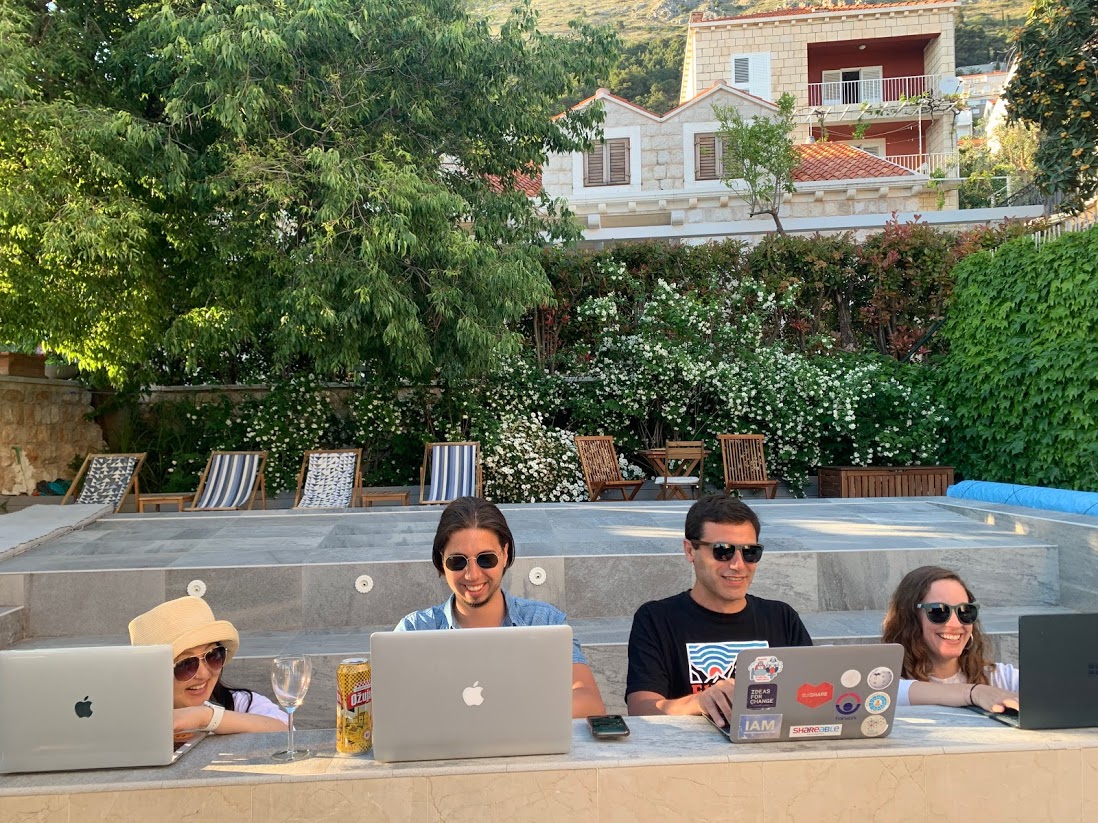
5. And what are the areas Croatia needs to focus on to improve its offer? Do you have 3 quick wins that Croatia and Zagreb could implement?
I won’t be very original as the recommendations we gave to Dubrovnik are largely applicable to Croatia in general and Zagreb in particular: 1) a “seal” that helps to identify DN friendly accommodations (including coliving) 2) as well as orchestrating an ecosystem of workspaces in the city (coworking, hotels, public libraries, etc.). 3) To think not only in terms of long term DNs but also in shorter experiences like ours in Dubrovnik (1 month) with the slightly different concept of “workations”. I see a lot of potential in this area, especially for European workers.
6. The future of work is a weighty topic. Without writing another excellent book on the subject, can you give us a snapshot of where this is all going, and how do cities like Zagreb prepare for the imminent huge change?
It’s impossible to predict where this is all going. Work (tasks), management of workforces and workplaces are being highly impacted by digital technologies. All at the same in all types of directions depending on each context. So the message is we are moving from a monolithic (quasi religious) perspective on what “work” is and means to a huge range of possibilities that we are only starting to experience and understand. Be flexible and eager to learn
In the project “Ciudad en Beta” (City in Beta), that we recently started, we are exploring how the new ways of working and living are creating a metamorphosis in the cities, metropolitan and rural areas. Check the twitter feed to get an idea of the topics at hand. My recommendation is to keep a truly systemic perspective. One must break functional, managerial and political silos while trying to prepare for these changes from a city perspective. Think about city services, economic development, real estate, tourism and citizens wellbeing at the same time. Keep an eye also on high tech developments that might have an impact on how we work in the next decade (telexistence, metaverse, etc.) while trying to anticipate sociological and cultural changes in the analysis. This last bit is the hardest to predict.
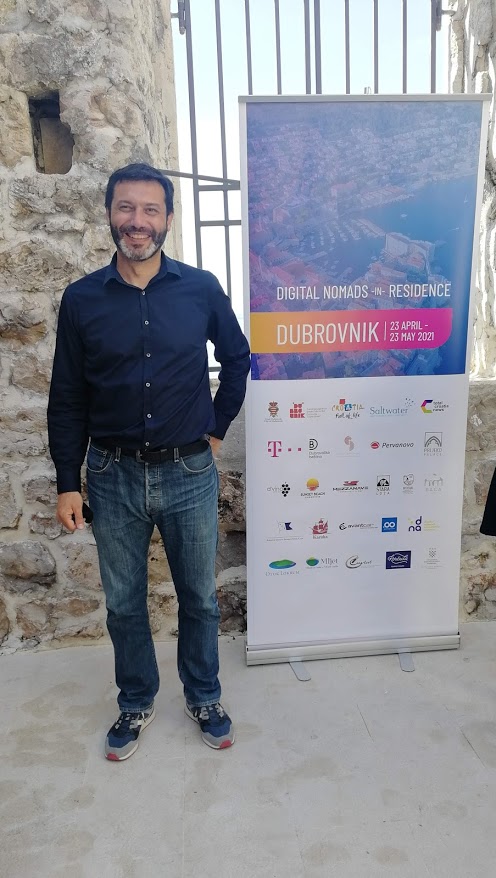
7. We are thrilled that you will be joining Zagreb Digital Nomad Week as a keynote speaker. Tell us a little about your involvement.
I wanted to travel back to Croatia but due to my new position that is, unfortunately, not possible. I will be part of the discussions around the future of work on friday explaining some of the topics mentioned in this interview and deep diving where people have more interest. I am really excited to “be back” to Croatia.
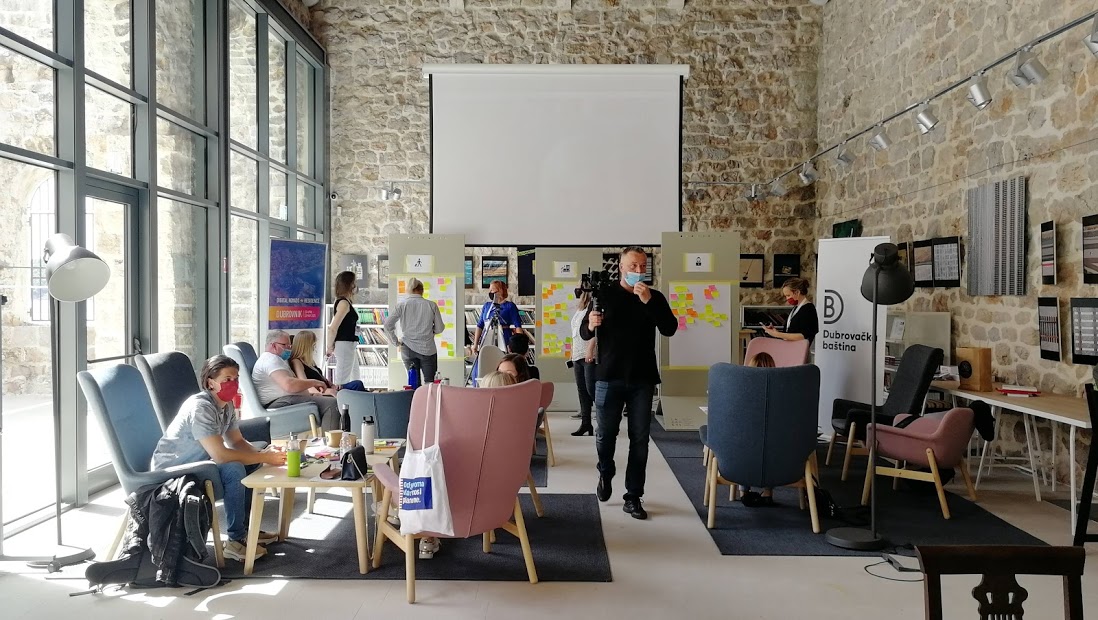
8. And lastly, if Croatia takes the correct steps to develop this niche, where do you see Croatia on the European stage for digital nomads in 3-5 years?
Clearly on the top 5 list of DN friendly destinations in the Mediterranean area. Hopefully with lots of links with other DN friendly destinations as part of, and maybe leading or co-leading, the network idea I hinted at before.
DNs growth in the next 3-5 years will create doubts and tensions in several areas of our work, life and social security systems which were designed and optimized for the traditional way of working. For it’s scale and dynamism I think Croatia can be at the forefront of the much needed experimentation.
You can register for free for Albert's presentation (and all other presentations), both online and in person on the Saltwater Nomads website.
Want a free month of accommodation from July to December as a Zagreb Digital Nomad Ambassador?
For the latest news and features on digital nomads in Croatia, follow the dedicated TCN section.
New Promotional Campaign Aimed at Israeli Market in Dubrovnik
19 June 2021 – The Dubrovnik Tourist Board released a new promotional video made for the Israeli market in Dubrovnik. The motivation behind it is the announcement of direct flights between Dubrovnik and Tel Aviv
Dubrovnik is a famous travel destination in many corners of the world. There are many things attracting travellers to it, none more so than its rich history. Dubrovnik’s history contains a very interesting story about the local Jewish community, and this is exactly the thing Dubrovnik Tourist Board capitalises on in this newest promotional campaign.
At the heart of the campaign is a short promotional video showing some highlights of Dubrovnik’s Jewish heritage. It is hosted by a local tour guide and member of the city’s Jewish community, Matija Singer. In a beautifully filmed, 5-minute video, viewers are taken around Dubrovnik’s historical centre. Mr. Singer expertly presents some of the most important places and artifacts in Hebrew. The video does have English subtitles, so make sure to watch it below.
Source: Dubrovnik Tourist BoardDirect Flights from Israel
The main driving force behind the campaign is the establishing of a direct flight from Tel Aviv to Dubrovnik. Dubrovacki Vjesnik reports the line will be operated by Croatia Airlines and Arkia Airlines. It will run from the beginning of July to the end of October. We are to see four flights per week with Arkia Airlines connecting the two cities on Mondays and Fridays and Croatia Airlines also running flights twice per week starting on July 15th.
This is exciting news for many in the tourism sector. Interest for Dubrovnik has been rising cautiously over the last decade on the Israeli market. Still, there is still plenty of room for progress. In 2019 local tourist board recorded only 6322 arrivals by Israeli guests. With these announced flights, Dubrovnik has a real chance of breaking those numbers and starting on the path of becoming an important destination for citizens of Israel. Considering this news comes now, while the city is still struggling with the lack of guests and international travel restrictions, it is even more exciting.
For more on travel in Croatia, follow TCN's dedicated page.
Vinistra 2021: Favourite Wine Event Opens in Poreč!
June 19, 2021 - Vinistra, this year, has been a celebration of Istria´s endeavours in containing COVID. Cancelled last year and postponed this year by a month, until everyone could be sure that it was safe, this year´s exhibition has moved from its usual venue in Porec to an open-air one on the seafront, where the safety of exhibitors and visitors is easier to maintain.
The awards were presented at a ceremony a week ago in Porec´s premier Hotel Parentium and this weekend, visitors have the opportunity to sample the best of Istria´s wines over a three-day period.
Vinistra is the culmination of a period of wine events, particularly the World of Malvasija, where Malvasijas from as far afield as Lanzarote and Greece are judged separately from the other grape types. Naturally, most are from Istria, but entries also came from Italy and Slovenia as well.
The Vinistra judging encompasses all the grape varieties available in Istria, including ones like Refosk that are popular in Slovenia, from which entries came and which got a lot of Gold Medals. Judging this year was a little different, as Caroline Gilbey MW, who normally leads it, was stuck in the UK with restrictions and was unable to come.
It isn't just about the big names, either. Denis Bernobic, who has a small winery in Markovac, was previously little known and doesn't even have a website, carried off the supreme award, over and above a Gold Medal, for his Young Malvasija. To have done so, while competing with the biggest and best wineries in the county, was no mean feat. Over 40 Malvasijas got Gold Medals this year, reflecting the very high standard.
Terans, Istria´s other main grape, was well represented with almost 20 Gold Medals of which Marko Fakin from Brkac picked up 5. His neighbour, Klaudio Tomaz, picked up another 3 of them. The Motovun area is clearly good for growing Teran, but the skills of these winemakers make the most of it. Kozlevic, Benvenutti and Degrassi also got Golds, as well as Deklic, from Ferenci, who picked up 2. Bruno Ferenac, his neighbour, picked up another Gold.
The lack of opportunity last year to have wine judged meant that this year many wineries submitted the wines they would have done last year, as well as those for this year. It has resulted in a greater number of entries.
Talking to winemakers about the effects of COVID on their businesses revealed that while the closure of restaurants, both here and in the export markets, obviously hit sales, many of them picked up new business domestically, as buyers bought to drink at home.
I used to think that Cuvees was just a way of blending in different wines, but the skill of these winemakers ensures that the result exceeds the sum of the parts. Deklic picked up 2 Gold Medals for his ones, with Damjanic, down in Fuskulin, getting his usual Gold for his excellent Clemente. Kozlovic, Degrassi and Rossi got Golds, as did Moreno Ivancic and Pervino from Novigrad. Damjanic also picked up the only Gold for his Borgonija. Whilst a traditional grape, it needs careful management and bunches removing to maintain the best of the remaining ones.
Cabernet Francs were less well represented, with another Ferenci winemaker, Julio Ferenac, picking up a Gold for his, alongside Degrassi´s well-known Contarini from Savudrija. Fiore, from Barboj, were the only other entry and got a Silver.
Deklic has done well this year, as he picked up a Gold for his Cabernet Sauvignon, as did Pino Rossi from Bajkini. Rossi´ś cousins, also at Bajkini, picked up a Gold for their Chardonnay, as did Franko Cattunar at Nova Vas.
Siljan, from Marcana, another lesser know winery, got a Gold Medal Plus, for their Merlot, and Deklic, again, got another Gold for his, alongside Tomaz and Medea with Angelo Brcic getting a well-deserved one for his Merlot Barrique.
Benvenutti got a special Gold for his San Salvatore Muscat. That guy makes the best proper dessert wines in the county. Klaudio Tomaz picked up 2 more Golds for his 2018 and 2020 Muscats . Capo, from Fernetici, got a Special Gold for his Yellow Muscat.
The exhibition is well laid out, allowing for a degree of social distancing and being held later in the day, offers a particularly pleasant view across the bay.. This year, following an earlier tradition but missing in recent years, the price of admission includes a glass, which you can keep. It is also part of their thinking to keep patrons safe. Hastily rinsed out hired glasses weren't considered ideal.
This year, there aren't any food events and there isn't a lecture programme, but, overall, they have made a good job of organising it in difficult circumstances.
For more on lifestyle in Croatia, follow TCN's dedicated page.
EURO 2020: Victory for Croatia Against Scotland Imperative for Round of 16 Spot
June 19, 2021 - A victory for Croatia against Scotland is now imperative for 2nd or 3rd place in Group D.
The second round of EURO 2020 Group D finished on Friday and Croatia currently sits in third place. After two draws on Friday, Croatia and the Czech Republic 1:1 and England and Scotland 0:0, the Czech Republic is in first, followed by England in second, Croatia in third, and Scotland in fourth, reports Gol.hr.
Croatia must beat Scotland on Tuesday if they want to go further and can no longer pass as the group winner. Finishing first in the group is not the best option, anyhow, as first place in Group D crosses over with the 'group of death' - Portugal, France, Germany, and Hungary.
Croatia's position will also depend on the second game in the group. Namely, if the Czech Republic and England play a draw in the last round, Croatia can only continue from third place, no matter how large the victory against Scotland. However, they will need a better goal difference to be placed among the best third-placed national teams.
If England wins minimally, Croatia must beat Scotland by three goals for second place, and any major England win will mean that Croatia needs a goal less to skip the Czech Republic.
If they have the same goal difference as the Czech Republic, second place will go to the team that has fewer yellow and red cards.
If Croatia doesn't go as second place, it seems that being among the best third-placed national teams in the competition is a probable option.
It should be noted that Scotland can also win third place with a victory, so it will be an all-or-nothing match.
Second place in Group D crosses over with the second-placed team from Group E (Spain, Poland, Sweden, Slovakia). If Croatia finishes third, they will play the winner of Group B (probably Belgium), the winner of Group E (Sweden or Spain), or the winner of Group C (Holland).
Theoretically, Croatia could go even further with a draw against Scotland, i.e. with only two points, but a lot has to coincide. Namely, Switzerland and Turkey have to draw in a direct clash for third place, Germany would have to lose to Portugal and still draw with Hungary in the end.
To follow the latest sports news in Croatia, follow TCN's dedicated page.
To learn more about sport in Croatia, CLICK HERE.
Slovenia Records Second Victory in Croatia Basketball Friendly Preparation Series
June 19, 2021 - Slovenia claimed their second victory in the Croatia basketball friendly preparation series held this week in Rijeka and Ljubljana.
In the second friendly preparatory match, Slovenia defeated Croatia at Arena Stožice in Ljubljana. Croatia looked more determined and coherent than in the first game in Rijeka.
Croatia was led by the excellent Mario Hezonja, who scored 37 points with 10 defensive rebounds, 3 assists, and 3 steals. Captain Roko Leni Ukić scored 23 points and assisted five times, and Miro Bilan reached double-digits with 10 points.
The very beginning of the game was not particularly promising. Slovenia took a 23-8 lead in the first quarter on the wings of Luka Dončić and Klemen Prepelič. Mario Hezonja broke up the bad spell with a three-pointer, and at the very end of the first quarter, Miro Bilan scored with a dunk for 26:15. Slovenia still had a serious lead.
Croatia took off in the second quarter, scoring 37 points in 10 minutes. Despite the good synergy between Luka Dončić and Mike Tobey, Croatia with Hezonja and Ukić showed that it could do much better than the predictions before the game.
The second half started with an advantage for Croatia, and in the third quarter, Croatia achieved the biggest advantage at 56:64 after a dunk by Luka Babić. The game was then even at 65:65 and 70:70, but Slovenia concluded the third quarter with 77:70 and ultimately sealed the victory in front of 8,000 home fans (97:88). Slovenia's most efficient players were Prepelič (31 points), Tobey (26 points), and 10 points with an incredible 17 assists from Dončić.
Coach Veljko Mršić: “The match was offensive on both sides. We played better than a couple of days ago in Rijeka, but we failed to keep that rhythm with a shortened rotation. We played a good game against a great team, and we managed what no one in the NBA did - keep Luka Dončić at 10 points (laughs), but we didn't manage to reduce his assists. He was impressive and emotional in front of the home crowd. Jokes aside, we took a step forward from what we did a few days ago. Now we are completing the team - the day after tomorrow, Ante Toni Žižić is arriving, and we are expecting a clash between the Clippers and Utah to see if Ivica Zubac or Bojan Bogdanović will come. We expect to be at an even higher level in 10 days and to achieve what we want - qualifying for the Olympic Games."
Captain Roko Leni Ukić: “We played a better game than two days ago. We can be somewhat satisfied, and above all, offensive, although there is certainly still plenty of room for improvement. We had a chance to play against one of the best players in the world. Even though he was not in perfect shape, it was obvious how much he means to his team, how much he plays everything around him, and that is the best test for what awaits us. I think we can get a lot of positive things out of today, but we have to be aware that we have to play better defense if we want to win."
To follow the latest sports news in Croatia, follow TCN's dedicated page.
To learn more about sport in Croatia, CLICK HERE.
Croatian Chamber of Commerce Seeking Aid for Caterers Until End of Year
June the 19th, 2021 - Many are hoping that the Croatian Government's aid and job preservation measures will continue being paid out until the end of the year, and the Croatian Chamber of Commerce (HGK) is one of the loud voices in that particular crowd.
As Poslovni Dnevnik/Marija Crnjak writes, the Association of Hospitality Activities of the Croatian Chamber of Commerce is asking that the government measures designed to help enterprises in this sector, which has been among the hardest hit by the anti-epidemic measures in Croatia, continue until the end of the year.
The aforementioned Association within the Croatian Chamber of Commerce desires this outcome regardless of epidemiological measures in place at any given time throughout the rest of this year, warning that in the first five months of 2021, only 50 percent of the turnover recorded back in pre-pandemic 2019 was achieved. This means that there is a continued pressure being placed on the Croatian hospitality and catering sector, despite the more favourable epidemiological situation, eased measures and the gradual return of tourism from abroad.
The Association from within the Croatian Chamber of Commerce suggests that the threshold for granting an exemption from needing to pay contributions on top of employee salaries of 4,000 kuna be lowered to those with a proven 30 percent drop in turnover. They propose the same conditions for the exercise of the right to reimbursement of paid fixed costs, and to ensure the payment of this support for the duration of epidemiological measures, they want this to be the case for the entire period in which the business of those in this line of work is limited.
"Recovery will continue long after the pandemic is over. Therefore, we propose that the permanent reduction of VAT on coffee, beer, wine, soft drinks and beverages and its equating with the accommodation and serving of food/desserts to 13 percent be taken very seriously.
We believe that this is a measure without an alternative that is needed to make the hospitality sector more stable and competitive, which will directly affect the increase of employment and investment,'' says the President of the Association, Drazen Boban, adding that to save tourism in Croatia this year, we need to urgently simplify the employment procedures required when employing third country nationals.
For more, follow our business section.
Minister Brnjac Tweets That 200,000 Tourists are Currently in Croatia
June the 19th, 2021 - Tourism Minister Brnjac has taken to Twitter to tweet that 200,000 tourists were staying in Croatia as of the 18th of this month, which is a fantastic sign for things to come as the very height of the summer tourist season rapidly approaches.
The current favourable epidemiological situation across Croatia and across most of Europe as the vaccination process picks up its pace and warm weather returns has allowed for a significant drop in coronavirus infection rates and the return of some sort of normality that we took so much for granted before the pandemic struck back in early 2020.
As such, more and more foreign tourists are arriving in Croatia, ready for some vitamin D and a swim in the glorious Croatian Adriatic sea after over a year of lockdowns and uncertainty surrounding travel, especially travel for leisure and tourism.
Croatian Tourism Minister Nikolina Brnjac took to social media to state that 200,000 tourists are holidaying in Croatia, and as things make a slow but steady return to semi normality, we might get a summer that looks something like it usually would have done in pre-pandemic times.
As Poslovni Dnevnik writes, Minister Brnjac's recent tweet reads: "According to the first data from the eVisitor system, the number of 200,000 tourists in one day was exceeded today (the 18th of June). Namely, there are currently 213,000 tourists in Croatia, of which 183,000 are foreign tourists and 30,000 local tourists.''
"This is a confirmation that tourists see Croatia as a safe destination for their stay and holiday. We have created all of the preconditions for that, and compliance with the epidemiological measures is still crucial in order to maintain this favourable epidemiological situation and to achieve a successful season,'' she added.
For all you need to know about coronavirus specific to Croatia, including travel, border and quarantine rules, as well as the locations of vaccination points and testing centres across the country, make sure to bookmark our dedicated COVID-19 section and select your preferred language.
For travel to and within Croatia, click here.
Prices of Croatia's Favourite Slavonian Delicacies Rising
June the 19th, 2021 - The prices of some of Croatia's favourite Slavonian delicacies are rising, with the price of the much loved Slavonian kulen potentially rising by as much as 100 kuna.
As Poslovni Dnevnik writes, the price of some Slavonian delicacies, such as kulen, could increase by 100 kuna, as was reported local portal Glas Slavonije.
Producers of dried meat products from the Eastern Croatian regions of Slavonia and Baranja, when compared to the producers of some other products, only partially felt the negative effects of the ongoing coronavirus pandemic.
The bigger producers of these typically Slavonian delicacies, who pointed out back in June last year that the pandemic had indeed caused certain problems with placement, especially from mid-March to mid-May, felt the most issues of all.
"People weren't going out and buying our products, and their purchasing power was reduced. However, the decline in those spring sales was partially compensated for during the summer and autumn of last year,'' said the director of the company Baranjka, Miodrag Komlenic.
Smaller producers of such produce claim to have managed to sell their stocks, and production, despite the pandemic, has thankfulyl not really been reduced - some have even expanded their offer.
"I can't say that the pandemic has stopped our sales. The demand is growing more and more, so I left only a certain amount in stock to meet the needs of our long-term customers,'' said Slobodan Stankovic.
He is also considering selling his items in smaller packages (of 100 or 200 grams), and is adamant that one kilo of kulen in his next ''round'' is going to cost 250 kuna (the current price is around 200 kuna per kilogram).
"One kilo of my kulen has been 200 kuna for years. But I think that the real price should be between 250 and 300 kuna,'' said Milodrag Stojkovic, the owner of a family farm (OPG) which produces Slavonian delicacies. He manages to rationalise this decision because of the raising of the price of fodder, which should soon increase by as much as 35 percent.
"Corn has already risen in price, I have to pay 200 kuna for 100 kilograms of that. I have to charge people these price increases because doing business will be impossible and completely unprofitable otherwise. Rising prices for various items are common, so it must be the same with cured meat products,'' Stojkovic concluded for Glas Slavonije.
For more, follow Made in Croatia.
For all you need to know about the wide variety of Croatian food, recipies and traditions from up and down the country, check our our dedicated section.
When Will Croatia Declare Pandemic End? Plans for Autumn Revealed
June the 19th, 2021 - If there is one question that has been firmly stuck on the lips of more or less everyone across the world for the past year or so, it is more than likely something along the lines of: when will the pandemic end? With hopes that vaccination will finally end this dark chapter that has held the entire planet in its grip, when will Croatia make its own declaration?
As Poslovni Dnevnik writes, the Croatian Minister of Health, Vili Beros, has spoken about the topic in further detail at a recently held press conference of the National Civil Protection Directorate, which has become the daily norm since the beginning of 2020 when the virus struck the country.
"Bozinovic said that Beros is going to be the one do declare the pandemic end, at the suggestion of the Croatian Institute of Public Health. That's exactly right. That will happen when we deveop enough immunity to the point where the profession says that we're safe from the spread of the virus.
"Today's measures are a turning point and are indeed finally leading us towards the end of the coronavirus pandemic. Let's look around, in Europe we're witnessing events that remind us of the old normal, covid certificates are working on guaranteeing our safety, we're finally seeing the light at the end of the tunnel, but we all need to get vaccinated,'' he added.
"We've been noticing that some of our fellow citizens are planning to be vaccinated only in autumn, that's a wrong approach, at this moment in time, it's known that the vaccine offers protection from the virus for at least eight months. We're doing something much more important - by vaccinating people we're preventing the appearance of a new wave of infection by the time autumn rolls around,'' Vili Beros concluded, having confirmed that he will be the one to declare the pandemic end here in Croatia.
For all you need to know about coronavirus specific to Croatia, including travel, border and quarantine rules, as well as the locations of vaccination points and testing centres up and down the country, make sure to bookmark our dedicated COVID-19 section and choose your preferred language.
New Infections Fall 42% Week on Week, Says Chief Epidemiologist
ZAGREB, 18 June 2021- Chief epidemiologist Krunoslav Capak said on Friday, last week saw a 42% drop in new coronavirus infections and called on people to be vaccinated despite the good epidemiological situation.
Speaking at a press conference of the national COVID-19 crisis management team, Capak said there were 814 new infections from Monday through Friday last week and 468 this week.
The team said the epidemiological situation was favourable and that Croatia ranked 12th in the EU in terms of 14-day incidence per 100,000 population.
Health Minister Vili Beroš said citizens who planned to be vaccinated in the autumn were making a wrong calculation. Vaccination now, at the start of the summer, prevents a new virus wave, he added. "At the moment we know the vaccine protects for at least eight months, and most probably longer.
Asked how possible manipulation with digital EU certificates would be prevented as of 1 July, for example a person showing someone else's certificate to attend an event, Interior Minister Davor Božinović said it was always possible to identify the certificate bearer and that he was confident that manipulation of that kind would be rare.
For more news from Croatia, CLICK HERE.


